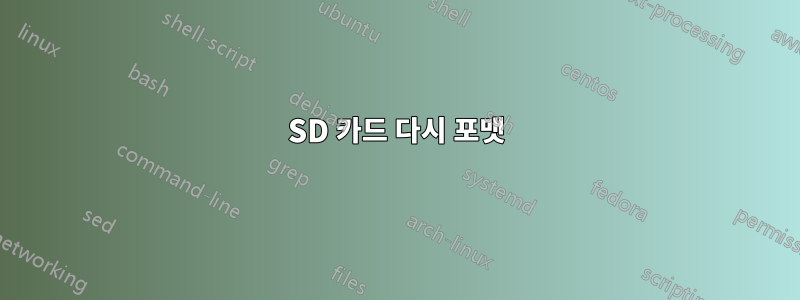
SD 카드를 공장 상태로 다시 포맷해야 합니다.
미디어에 사용되는 SD 카드 파일 시스템이 손상되었습니다. 특정 디렉토리에 액세스하면 파일 시스템이 읽기 전용으로 다시 마운트되며 삭제할 수 없습니다. fsck.vfat에는 특정 유형의 손상에 대한 복구 방법이 없다고 나와 있습니다.
답변1
알림: 이와 같은 명령은 파일 시스템 데이터를 덮어쓰도록 설계되었습니다. 잘못된 디스크를 대상으로 지정하지 않도록 각별히 주의해야 합니다.
편집하다:
카드를 포맷하기 전에 폐기 작업을 수행할 수도 있습니다.
blkdiscard /dev/mmcblk0
이는 SATA SSD의 TRIM과 마찬가지로 성능을 향상시킬 수 있습니다. 블록 재매핑 레이어를 재설정하면 이론적으로 해당 레이어 또는 그 주변의 손상을 해결하는 데 도움이 될 수도 있지만, 이 방법은 전용 전체 장치 지우기 명령(SATA 보안 지우기)만큼 좋지는 않습니다. 일부 카드 리더에서는 이 기능이 지원되지 않을 수 있습니다. 내 Dell Latitude 노트북에서는 1초 만에 카드가 모두 0으로 재설정되었습니다. 이는 이 카드에서는 블록 재매핑 레이어에만 영향을 미쳤음을 의미합니다. 16GB 플래시 전체를 즉시 삭제할 수는 없습니다.
MicroSD 카드에는 하나 이상의 플래시 칩과 SD 카드 사양과 플래시 칩 간의 인터페이스 역할을 하는 소형 마이크로프로세서가 포함되어 있습니다. 카드는 일반적으로 최적에 가까운 성능을 위해 공장에서 포맷됩니다. 그러나 대부분의 운영 체제 기본 파티셔닝 및 포맷 유틸리티는 카드를 기존 하드 드라이브처럼 취급합니다. 기존 하드 드라이브에 적합한 방식은 플래시 기반 카드의 성능과 수명을 저하시킵니다.
http://3gfp.com/wp/2014/07/formatting-sd-cards-for-speed-and-lifetime/
스크립트는 최대 32GiB의 카드에 사용할 수 있습니다. 현재 버전에서 작동하도록 수정했습니다 sfdisk. 결과 파티션에서 실행하면 file -s트랙당 헤드/섹터 수를 제외하고 이전과 동일한 숫자가 반환되었습니다. 일부 임베디드 부트로더에는 특정 값이 필요하지만 이는 현재 운영 체제에서 사용되지 않습니다.
#! /bin/sh
# fdisk portion of script based on mkcard.sh v0.4
# (c) Copyright 2009 Graeme Gregory <[email protected]>
# Additional functionality by Steve Sakoman
# (c) Copyright 2010-2011 Steve Sakoman <[email protected]>
# Updated by Alan Jenkins (2016)
# Licensed under terms of GPLv2
#
# Parts of the procudure base on the work of Denys Dmytriyenko
# http://wiki.omap.com/index.php/MMC_Boot_Format
# exit if any command fails
set -e
export LC_ALL=C
format_whole_disk_fat32() {
if ! id | grep -q root; then
echo "This utility must be run prefixed with sudo or as root"
return 1
fi
local DRIVE=$1
# Make sure drive isn't mounted
# so hopefully this will fail e.g. if we're about to blow away the root filesystem
for mounted in $(findmnt -o source | grep "^$DRIVE") ; do
umount "$mounted"
done
# Make sure current partition table is deleted
wipefs --all $DRIVE
# Get disk size in bytes
local SIZE=$(fdisk -l $DRIVE | grep Disk | grep bytes | awk '{print $5}')
echo DISK SIZE – $SIZE bytes
# Note: I'm changing our default cluster size to 32KiB since all of
# our 8GiB cards are arriving with 32KiB clusters. The manufacturers
# may know something that we do not *or* they're trading speed for
# more space.
local CLUSTER_SIZE_KB=32
local CLUSTER_SIZE_IN_SECTORS=$(( $CLUSTER_SIZE_KB * 2 ))
# This won't work for drives bigger than 32GiB because
# 32GiB / 64kiB clusters = 524288 FAT entries
# 524288 FAT entries * 4 bytes / FAT = 2097152 bytes
# 2097152 bytes / 512 bytes = 4096 sectors for FAT size
# 4096 * 2 = 8192 sectors for both FAT tables which leaves no
# room for the BPB sector
if [ $SIZE -ge $(( ($CLUSTER_SIZE_KB / 2) * 1024 * 1024 * 1024 )) ]; then
echo -n "This drive is too large, >= $(($CLUSTER_SIZE_KB / 2))GiB, for this "
echo "formatting routine."
return 1
fi
# Align partitions for SD card performance/wear optimization
# Summary: start 1st partition at sector 8192 (4MiB) and align FAT32
# data to start at 8MiB (4MiB logical)
# There's a document that explains why, but its too long to
# reproduce here.
{
echo 8192,,0x0C,*
} | sfdisk -uS -q $DRIVE
sleep 1
if [ -b ${DRIVE}1 ]; then
PART1=${DRIVE}1
elif [ -b ${DRIVE}p1 ]; then
PART1=${DRIVE}p1
else
echo "Improper partitioning on $DRIVE"
return 1
fi
# Delete any old filesystem visible in new partition
wipefs --all $PART1
# Format FAT32 with 64kiB clusters (128 * 512)
# Format once to get the calculated FAT size
local FAT_SIZE=$(mkdosfs -F 32 -s $CLUSTER_SIZE_IN_SECTORS -v ${PART1} | \
sed -n -r -e '/^FAT size is/ s,FAT size is ([0-9]+) sectors.*$,\1,p')
# Calculate the number of reserved sectors to pad in order to align
# the FAT32 data area to 4MiB
local RESERVED_SECTORS=$(( 8192 - 2 * $FAT_SIZE ))
# Format again with padding
mkdosfs -F 32 -s $CLUSTER_SIZE_IN_SECTORS -v -R $RESERVED_SECTORS ${PART1}
# Uncomment to label filesystem
#fatlabel ${PART1} BOOT
}
#set -x
format_whole_disk_fat32 "$@"


